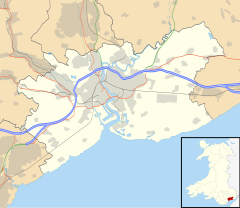Bishton or Bishopston (Welsh: Llangadwaladr Trefesgob or simply Trefesgob) is a small rural community in the east of the city of Newport, South Wales. It lies in the Llanwern electoral district (ward)[2] and contains the eastern end of Llanwern steelworks, the Underwood estate as well as Bishton itself. The population in the 2001 census was 2,181; dropping to 2,137 in 2011.[3]
| Bishton | |
|---|---|
 St Calwaladr's Church | |
Location within Newport | |
| Population | 2,181 (2001 census[1]) |
| Language | English Cymraeg (Welsh) |
| OS grid reference | ST391876 |
| Principal area | |
| Country | Wales |
| Sovereign state | United Kingdom |
| Post town | NEWPORT |
| Postcode district | NP18 |
| Dialling code | 01633 Llanwern exchange |
| Police | Gwent |
| Fire | South Wales |
| Ambulance | Welsh |
| UK Parliament | |
| Senedd Cymru – Welsh Parliament | |
The name is said to derive from "Bishop's Town", as the village has been alleged to be the sometime home of the Bishops of Llandaff. Owain Glyndŵr destroyed the palaces at Bishton and Llandaff, from which time the episcopal palace was moved to Mathern.[4] Bishop John Pascall died here of the plague in 1361.[5]
The remains of Bishton Castle, located to the west of Bishton Road, are a scheduled monument.[6][7]
Government
editThe area is governed by the Newport City Council and the Bishton community council.[8]
St Cadwaladr's church
editThe dedication of Bishton church to Cadwaladr is one of only two known instances, the other being in Llangadwaladr in Anglesey, though St Mary's Church, Magor may also have been originally dedicated to him. Cadwaladr was the final Welsh King of Britain, dying in AD 664.[5]
The decorated and perpendicular church was badly damaged in 1760 when the tower collapsed. Restoration followed, and in the 19th century the porch was added. Some windows date from the 18th century, but many are later, from the Victorian era. The origins of the chancel arch are unclear while the font is late medieval. The east stained glass window is from 1915.[5] The church was designated as a Grade II listed building in 1963.[9]
Welsh remained the language of church services at Bishton until 1828. Sunday Worship is held at 11.00 am, on the 1st and 3rd Sundays.[5] The church is subject to a gateway grant from the National Churches Trust. In 2020 the need for restoration work primarily to the tower, was highlighted. A project will develop repair proposals and will include an ecology survey.[10]
References
edit- ^ "Local statistics - Office for National Statistics". www.neighbourhood.statistics.gov.uk. Retrieved 7 September 2018.
- ^ "Community Well-being Profile: Llanwern Final" (PDF). Newport City Council. May 2017. p. 5. Retrieved 7 May 2022.
- ^ "Custom report - Nomis - Official Labour Market Statistics". www.nomisweb.co.uk.
- ^ Hando, F. J. (1944). "11: Mathern, Moynes Court and Mounton". The Pleasant Land of Gwent. Newport: R. H. Johns.
- ^ a b c d "St Cadwaladr's Church, Bishton". Netherwent Ministry Area. Retrieved 3 October 2023.
- ^ Stuff, Good. "Bishton Castle, Bishton (Trefesgob), Newport (Casnewydd)". ancientmonuments.uk.
- ^ "English – Coflein". coflein.gov.uk.
- ^ "Parish council - Bishton Community Council". democracy.newport.gov.uk. 3 October 2023.
- ^ Cadw. "Parish Church of St Cadwaladr (Grade II) (2907)". National Historic Assets of Wales. Retrieved 3 September 2023.
- ^ "St Cadwaladr | National Churches Trust". www.nationalchurchestrust.org. Retrieved 3 January 2022.
